Crash barrier roll forming machines are specialized lines designed to cold-form metal coils into corrugated guardrails and road safety barriers. This automated process efficiently produces finished crash barrier beams.
This comprehensive guide provides everything you need to know about crash barrier roll forming equipment, including:
Introduction to Crash Barrier Roll Forming
Roll forming shapes flat steel coil into corrugated crash barrier beams using a series of progressive bending dies.
Benefits:
- Highly efficient continuous forming
- Consistent and accurate beam dimensions
- Minimal material waste
- Automated mass production
- Flexibility to change beam profiles
Main Components:
- Coil payoff reel
- Feed rollers
- Forming stations
- Flying cutoff
- Control system
Latest crash barrier roll formers deliver high speed production, precision and reliability for road safety applications.
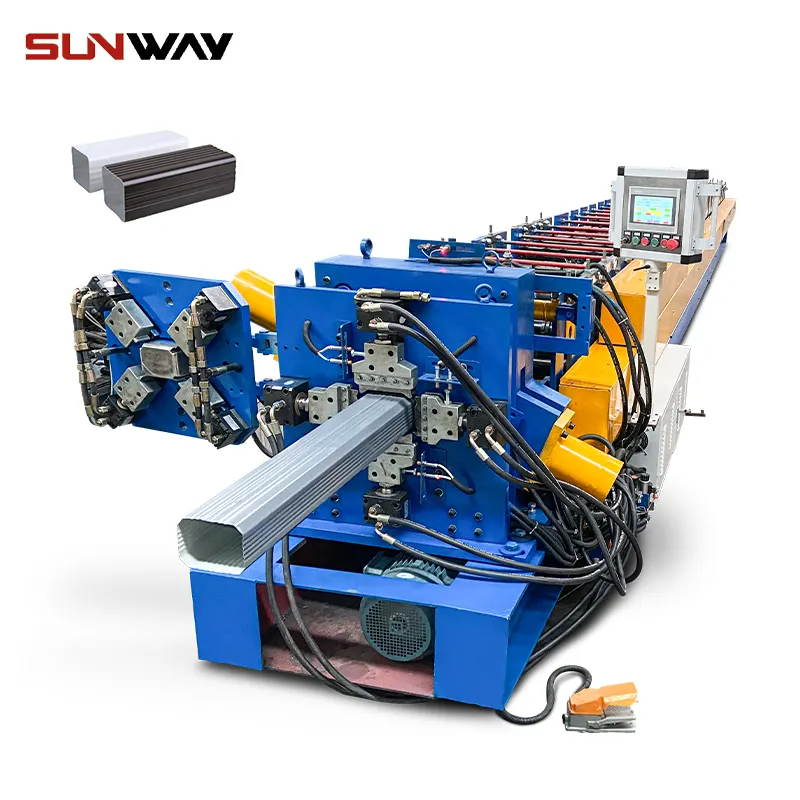
Types of Crash Barrier Roll Forming Machines
Crash barrier roll forming machines come in several configurations:
| Types | Descriptions |
|---|---|
| Mechanical | Basic machines with mechanical drives |
| Servo-motor | Advanced programmable servo motor drives |
| All-electric | Energy efficient AC motors |
| Hydraulic | Powered by hydraulic power packs |
| Automatic | Fully automated infeed and cutoff |
| Portable | Compact mobile roll formers |
Modern servo-controlled roll formers with automated features provide the best accuracy and productivity.
Crash Barrier Profiles Produced
Common corrugated profiles that can be roll formed include:
- W-beam – Most common symmetrical corrugated shape
- Thrie-beam – Asymmetrical beams with nested joints
- Box-beam – Hollow rectangular beams
- Single slope – Gradual sloped on one side
- Vertical wall – One vertical corrugated side
- Custom – Specialized profiles
With quick die changeover, lines can rapidly switch between different crash barrier profiles.
Crash Barrier Materials Used
Typical materials roll formed into road safety barriers:
- ASTM A36 steel
- Hot-rolled steel
- Galvanized steel
- Corten weathering steel
- Stainless steel
- Aluminum
Steel provides the optimal balance of strength, corrosion resistance, cost and weight for durable crash barriers.
Crash Barrier Roll Forming Process
The production sequence involves:
- Loading a coil of the substrate material into the feed system
- Feeding the strip through progressive roll forming stations
- Gradually cold-forming the corrugated beam profile
- Shearing the beams to specified length with flying cutoff
- Conveying finished crash barrier sections for stacking
Automated servo-motor controls precisely coordinate material movement through the in-feed, forming, cutoff and exit conveyor for high speed production.
Crash Barrier Roll Former Specifications
Typical specifications can be customized:
| Parameters | Range |
|---|---|
| Forming Speed | 10 – 40 m/min |
| Strip Width | 200 – 500 mm |
| Thickness | 2 – 5 mm |
| Beam Height | 150 – 900 mm |
| Corrugation Size | 50 – 200 mm |
| Sheet Length | 6 – 12 m |
| Power | 20 – 75 kW |
| Automation | Manual to Fully Automatic |
Choosing appropriate strip parameters, beam dimensions and speed capacity is vital.
Standards for Crash Barriers
Major standards include:
- AASHTO M180 – Corrugated sheet steel beams for highway guardrail
- EN 1317 – Road restraint systems
- NCHRP 350 – US standard for crash testing
- AS/NZS 3845 – Road safety barrier systems
- BS 6779-2 – Vehicle restraint systems on roads
Compliance is critical for performance, quality and safety.
Crash Barrier Roll Former Manufacturers
Leading global manufacturers of crash barrier roll forming lines include:
| Company | Location | Description | Pricing |
|---|---|---|---|
| Metform | USA | Custom high capacity lines | $$ to $$$ |
| Behemoth | Canada | Robust heavy duty lines | $$ to $$$ |
| Eurobend | UK | Reliable European lines | $$ to $$$ |
| Zhongrui | China | Affordable standard lines | $ to $$ |
| Fors | Italy | High precision lines | $$$ |
| Its | Korea | Value engineered lines | $ to $$ |
Pricing Considerations:
- Production speed and automation
- Line width capacity
- Quick changeover functionality
- Brand, quality and support services
- Customization of specifications
Partner with qualified manufacturers providing properly engineered equipment matched to your production needs.
-
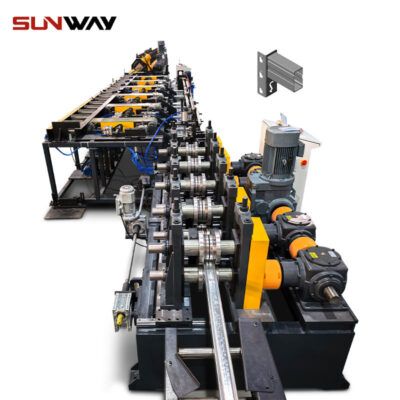 Storage Rack Shelf Box Panel Making Machine Steel Storage Rack System Box Beam Roll Forming Line
Storage Rack Shelf Box Panel Making Machine Steel Storage Rack System Box Beam Roll Forming Line -
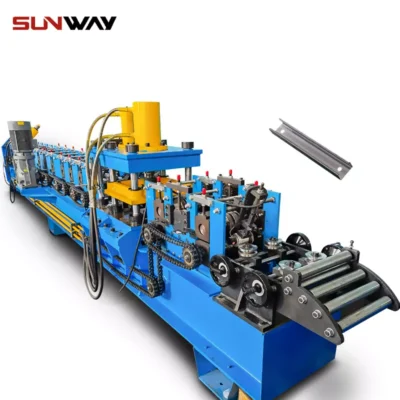 C Section Bracing Omega Storage Rack Upright Post Roll Forming Machine
C Section Bracing Omega Storage Rack Upright Post Roll Forming Machine -
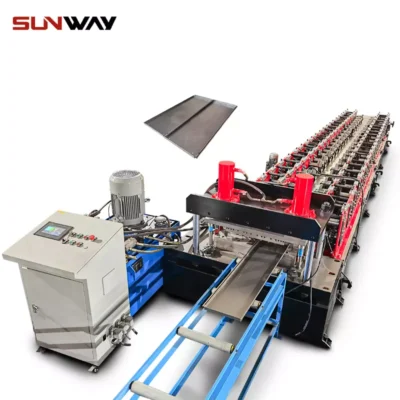 Steel Box Plate Making Roll Forming Machine
Steel Box Plate Making Roll Forming Machine -
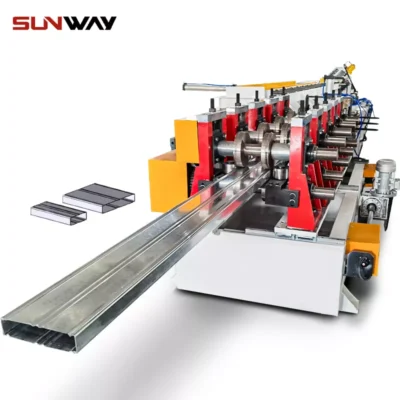 Box Beam Steel Roll Forming Machine For Shelf Column
Box Beam Steel Roll Forming Machine For Shelf Column -
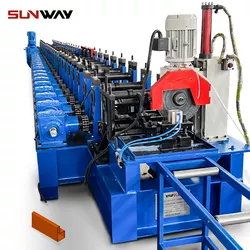 Pallet Racking Step Beam P Beam Roll Forming Machine
Pallet Racking Step Beam P Beam Roll Forming Machine -
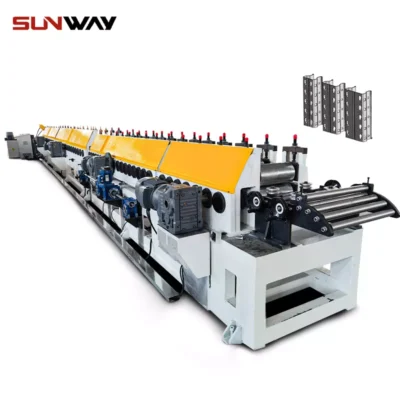 Warehouse Shelf Upright Roll Forming Machine
Warehouse Shelf Upright Roll Forming Machine
Buying Considerations for Crash Barrier Lines
Important factors when investing in crash barrier roll forming equipment:
- Required barrier specifications and profile
- Production volume and speed goals
- Width capacity for coil stock
- Level of automation preferred
- Quick changeover ability between profiles
- Precision, accuracy and reliability required
- Available production space and layout
- Power supply needs
- Operator skill level
- Ongoing service and support
Clarifying key requirements will help identify optimal roll former specifications and capabilities.
Installing and Operating Crash Barrier Roll Forming Machines
Proper installation and operation procedures include:
- Stable, level and smooth foundation
- Adequate space around the equipment
- Securing stations and verifying alignments
- Electrical, pneumatic and hydraulic connections
- Integrating safety features and protocols
- Programmed setup and trials for each profile
- Preventive maintenance and lubrication
- Adhering to all safety procedures
Thorough installation, commissioning and maintenance maximizes production uptime and achieves a long service lifetime.
Benefits of Crash Barrier Roll Forming
Key advantages versus other forming methods:
- Continuous high speed production from coil
- Consistent and precision barrier dimensions
- Minimal material waste
- Lower operational costs
- Flexible, quick changeovers between profiles
- Safer enclosed process than open fabrication
- Automated process ideal for large volume production
- Integrates with other highway safety systems
Roll forming provides an efficient and economical barrier fabrication method.
Limitations of Crash Barrier Roll Forming
Some limitations include:
- High initial capital expenditure
- Substantial production volumes required for ROI
- Dedicated tooling for each profile
- Size constraints – width, bend radii etc.
- Material thickness and strength capabilities
- Secondary operations like punching may be needed
Other processes like press braking or stamping may suit lower volume production.
Cost Analysis for Roll Formed Barriers
- Equipment – $100,000 to $750,000
- Tooling per profile – $5,000 to $15,000
- Material coil – Varies based on steel specs
- Operating costs – Labor, maintenance, utilities
- Amortized equipment cost – Based on yearly production rate
- Secondary processing – Punching, coring, etc.
- Logistics – Inbound coils, outbound barrier delivery
High production levels provide lowest cost per linear foot and rapid payback on equipment.
Future Outlook for Crash Barrier Roll Forming
The future outlook for crash barrier roll forming is positive:
- Increasing roadway construction worldwide
- Transition from manual fabrication to automated lines
- Declining equipment costs over time
- Improving line speed, precision, efficiency and flexibility
- Quick-change tooling enabling faster changeovers
- Tighter integration with upstream coil processing
- Overall industry maturation and manufacturing optimization
- New high-strength steels and coatings
With technology improvements, roll formed barriers will continue displacing other approaches.
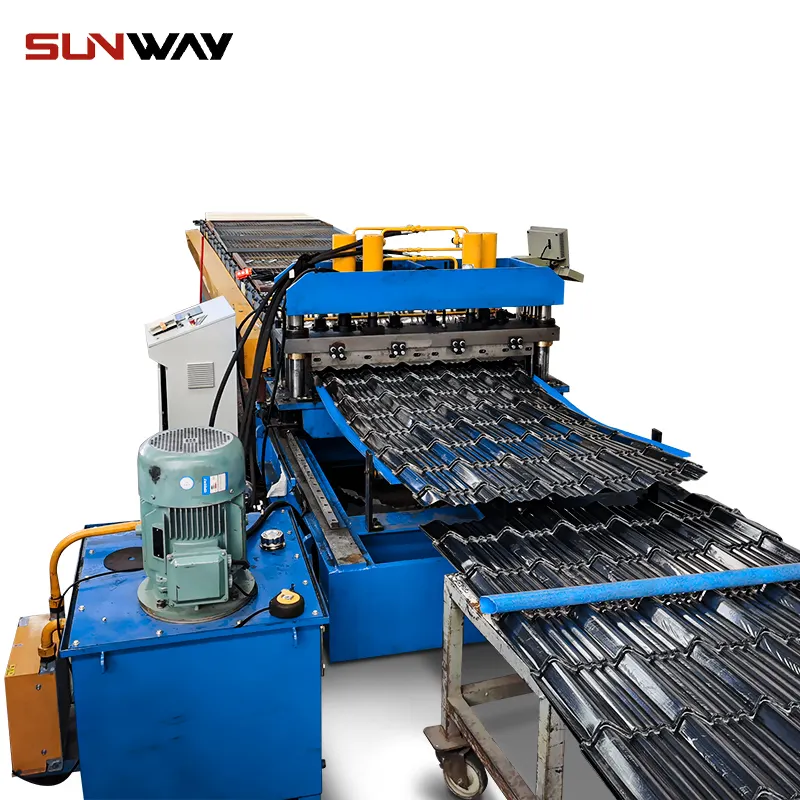
FAQ
Q: What materials can be roll formed into crash barriers?
A: Most commonly ASTM A36, hot-rolled, galvanized and Corten weathering steel. Other metals like aluminum and stainless steel can also be formed.
Q: What thickness coils are typically formed into barriers?
A: Standard thicknesses are 2mm to 5mm. Maximum depends on equipment capacity.
Q: How long does it take to form each barrier section?
A: On high speed lines producing 12m lengths, barriers can be formed in under 1 minute.
Q: How are roll formed barriers cut to length?
A: A flying cutoff shear built into the line cuts barriers at the production speed.
Q: What expertise is required to operate a barrier roll former?
A: Machine operators require training. Skilled technicians needed for programming, maintenance and troubleshooting.
Q: What safety equipment is mandatory?
A: Guards, e-stops, interlocks, automatic shutdowns, and strict operating procedures.
Q: How much does a crash barrier roll forming line cost?
A: Equipment costs range from $100k to $750k+, depending on the production speed, width, automation level, and features.
Q: How much does tooling cost for each barrier profile?
A: Roll forming tooling typically costs $5k to $15k per profile set, based on size and complexity.
Q: How long does it take to changeover between profiles?
A: With quick change tooling, profile changeover takes 15-45 minutes typically.
Q: Can custom barrier profiles be produced?
A: Yes, custom tooling allows production of specialized proprietary barrier designs.
Frequently Asked Questions (FAQ)
1) Can a Crash Barrier Roll Forming Machine meet EN 1317 performance classes?
Yes. The machine must produce beams within tight dimensional tolerances and integrate punching patterns compatible with tested systems. Final compliance depends on full system crash testing (barrier, posts, spacers, terminals), not the machine alone.
2) What inline operations are most common for W-beam and Thrie-beam lines?
Typical stations include pre-punching of bolt/slot holes, logo/heat number marking, camber control, edge hemming or deburring, and flying cutoff. Post-punching is used when hole accuracy must reference the final corrugation.
3) How does material grade affect forming passes and speed?
Higher-strength steels (e.g., S355–S500) require more forming stations with reduced per-pass strain and generally run 10–30% slower than mild steel to avoid edge cracking and springback.
4) What cut-length accuracy is achievable on 6–12 m barrier beams?
With encoder-synced servo flying shears and anti-backlash mechanics, ±1.0–2.0 mm is typical at 20–35 m/min. Heavier gauges and complex profiles may push toward ±2.0 mm.
5) What foundation and alignment tolerances are recommended?
A level, reinforced slab with flatness within ±1 mm/m and total line misalignment under 0.05 mm per stand is recommended to control twist, bow, and hole-to-edge distances.
2025 Industry Trends for Crash Barrier Roll Forming Machines
- Servo-electrification and energy visibility: Regenerative drives and stand-level metering cut energy 12–22% and enable kWh/beam benchmarking.
- Digital twins for pass design: FEA-first tooling reduces tryout loops and improves corrugation fidelity, especially on Thrie-beam.
- Inline QC adoption: Laser/camera systems monitor beam height, pitch, hole positions, and camber in real time, reducing scrap 10–25%.
- High-strength, zinc-aluminum coatings: Wider use of S355/S420 and ZM (zinc-magnesium) coatings for longer life and thinner zinc layers.
- Safety and compliance by design: ISO 13849-1 PLd safety circuits, interlocked guards (ISO 14120), and CE/UL-ready packages standard on export lines.
2025 Snapshot: Market, Technology, and Performance
| Metric (2025) | Value/Range | Relevance to Crash Barrier Roll Forming Machine buyers | Source |
|---|---|---|---|
| Global roll forming equipment CAGR (2025–2029) | 5–7% | Sustained capex for highway/infra components | Grand View Research; MarketsandMarkets |
| Inline laser/vision QC adoption on new barrier lines | ~35–45% | Fewer defects in hole pitch and corrugation | FFJournal; Modern Metals (2024–2025) |
| Energy savings (servo-electro vs hydraulic) | 12–22% | Lower OPEX, easier ISO 50001 audits | ABB/Siemens application notes |
| Typical cut-length accuracy at 25–30 m/min | ±1.0–2.0 mm | Minimizes fit-up issues on site | OEM datasheets |
| Changeover with cassette tooling (W↔Thrie) | 30–60 min | Higher uptime for mixed contracts | OEM case studies (Dallan, Formtek, Gasparini) |
| Common material grades for guardrails | S235–S420 (2.5–4.0 mm) | Balances strength and formability | EN 10025; AASHTO M180 references |
Note: Verify with local standards (e.g., EN 1317 containment levels, AASHTO M180 classes) and project specifications.
Latest Research Cases
Case Study 1: Digital Twin Reduces Scrap on Thrie-Beam Production (2025)
Background: An EU fabricator switching from W-beam to Thrie-beam experienced 4.2% scrap due to corrugation pitch drift and hole-to-edge tolerance failures.
Solution: Implemented FEA-based pass design; added one intermediate stand, updated entry guide geometry, and introduced inline laser pitch/width monitoring.
Results: Scrap reduced to 1.6%; dimensional CpK improved from 1.1 to 1.6; maintained 28 m/min with cut accuracy ±1.2 mm.
Case Study 2: Energy Retrofit on Hydraulic Crash Barrier Line (2024)
Background: Legacy hydraulic line (3.5 mm galvanized steel) faced high energy costs and bearing wear.
Solution: Retrofitted regenerative servo main drive, condition monitoring (vibration/temperature) on stands, and auto-lube dosing; optimized flying shear profiles.
Results: 16% kWh/ton reduction; unplanned downtime -35%; OEE rose from 81% to 87%; payback achieved in 15 months.
Expert Opinions
- Prof. Markus Klein, Chair of Metal Forming, RWTH Aachen University
“Limiting equivalent plastic strain per stand and validating corrugation pitch via FEA are essential when forming high-strength guardrail steels to prevent edge cracking and springback.” - Elena Kovalenko, Director of Manufacturing Engineering, Hilti Group
“For high-mix infrastructure parts, cassette tooling with standardized datum schemes is the fastest route to predictable changeovers without sacrificing profile stability.” - David Chen, Senior Sustainability Advisor, WSP
“Stand-level metering and EPD-backed steel procurement aligned with ISO 50001 are increasingly part of tender requirements for roadway projects.”
Practical Tools/Resources
- Simulation and pass design: Altair Inspire/Forming (https://altair.com), AutoForm RollForm (https://www.autoform.com)
- Inline metrology: Keyence laser/vision (https://www.keyence.com), Micro-Epsilon (https://www.micro-epsilon.com)
- Drives and automation: Siemens SINAMICS (https://new.siemens.com), ABB Drives (https://new.abb.com/drives), Beckhoff TwinCAT (https://www.beckhoff.com)
- Standards and guidance: AASHTO M180 (https://www.transportation.org), EN 1317 (https://standards.cen.eu), NCHRP 350 (https://www.trb.org), ISO 13849-1 and ISO 14120 (https://www.iso.org)
- Materials/coatings: European Coil Coating Association (https://www.prepaintedmetal.eu), ArcelorMittal guardrail steel datasheets (https://construction.arcelormittal.com)
- Best practices and case studies: FMA (https://www.fmamfg.org), FFJournal (https://www.ffjournal.net), Modern Metals (https://www.modernmetals.com)
Citations: Cross-check market data and performance ranges with Grand View Research, MarketsandMarkets, OEM technical notes (Siemens/ABB), and industry journals (FFJournal, Modern Metals). Standards must be sourced from AASHTO, CEN/EN, ISO, and TRB/NCHRP publications.
Last updated: 2025-10-23
Changelog: Added 5 targeted FAQs; inserted 2025 trends with data table; provided two recent case studies; included expert viewpoints; curated practical tools/resources with authoritative links.
Next review date & triggers: 2026-05-15 or earlier if EN 1317/AASHTO updates are released, OEMs launch next-gen cassette systems, or inline QC adoption exceeds 50% of new lines.
